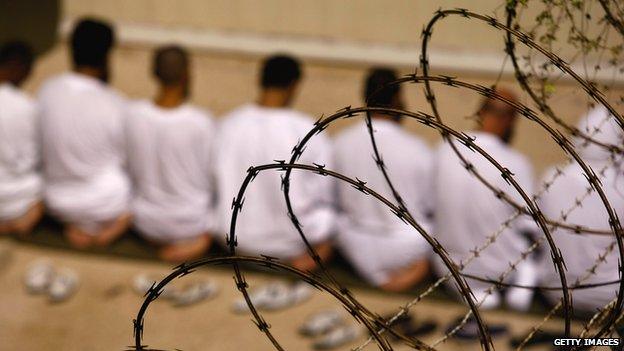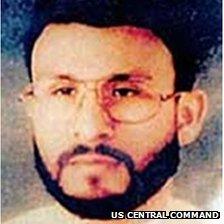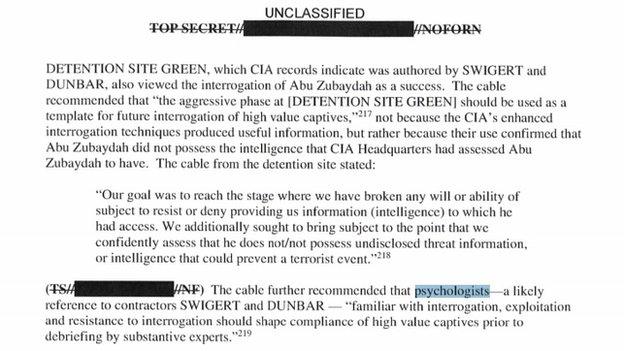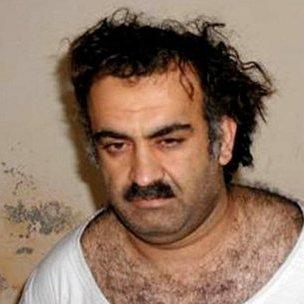CIA report: Who are the unlikely interrogators?
- Published

Two psychologists hired by the Central Intelligence Agency (CIA) to develop enhanced interrogation procedures lacked the relevant experience, a new report finds.
The contractors had no background in counterterrorism, yet were paid more than $80m (£51m) for their services.
The CIA also allowed the men to assess the effectiveness of their own interrogation programme.
The revelations are outlined in a new Senate report on the "brutal" interrogations of al-Qaeda suspects in the years after the 9/11 attacks.
Suspects were interrogated using methods such as waterboarding, slapping, humiliation, exposure to cold and sleep deprivation.
Such procedures were developed, managed and reviewed by two contract psychologists with experience at the US Air Force Survival, Evasion, Resistance and Escape school.

Senate intelligence committee chairwoman Dianne Feinstein spearheaded the release of the report
But the report says "neither psychologist had any experience as an interrogator, nor did either have specialised knowledge of al-Qaeda, a background in counterterrorism, or any relevant cultural or linguistic expertise".
And yet, the two men were said to have personally participated in the interrogation of some of the CIA's "most significant" detainees.
They also determined whether a detainees' psychological state allowed for the ongoing use of enhanced interrogation, the report finds.
Meanwhile, the men served as liaisons between the CIA and foreign intelligence services, and were allowed by the intelligence agency to assess the effectiveness of their own work - work that was ultimately found by the Democrats on the Senate intelligence committee to be brutal and ineffective.
Identified under the pseudonyms Dr Grayson Swigert and Dr Hammond Dunbar in the report, the two men have been revealed by US media as military retirees Jim Mitchell and Bruce Jessen.
Former CIA lawyer John Rizzo on 'enhanced interrogation': "I don't think I had any other choice."
Dr Mitchell joined the Air Force in 1974, specialising in bomb disarmament before earning a doctorate in psychology focusing on diet, exercise and hypertension, according to the New York Times, external.
Dr Jessen, meanwhile, earned a doctorate focusing on "family sculpting" and later became a psychologist with the Air Force Survival School responsible for screening instructors posing as enemy interrogators.
Both men, said to be lieutenant colonels, became defence department experts on resisting enemy interrogations - but fellow psychologists reported scepticism and even concern regarding their methods, the New York Times adds.
After the 9/11 attacks, the Senate report says Dr Mitchell proposed using a concept called "learned helplessness" in interrogating al-Qaeda suspects to ensure complicity with captor's demands.
At the time, experienced interrogators argued such a strategy would demoralise a prisoner to such an extent that he would say whatever the interrogator expected.

Abu Zubaydah was waterboarded by the CIA
In 2002, both men were tasked with reviewing a seized al-Qaeda manual which coached terrorists in how to resist interrogation.
In response, the men proposed introducing brutal techniques, including sleep deprivation and waterboarding, into US procedures.
When US operatives captured high-value target Abu Zubaydah, two Federal Bureau of Investigation agents used conventional methods to interrogate him at a Thailand CIA facility.
Then the CIA, as advised by Dr Mitchell, stripped the suspect and blasted music at him to prevent sleep. In the following weeks, Dr Mitchell reportedly took control of the interrogation and directly questioned the suspect himself.
Mr Jessen later joined the effort, and the suspect was waterboarded 83 times before it was determined he had no further information to offer.
According to the Senate report, a cable said to be authored by the two men indicated the interrogation of Zubaydah was a success.
It "should be used as a template for future interrogation of high value captives," they wrote, not because it produced useful information but instead because it confirmed the suspect did not possess the intelligence information the CIA had believed he was withholding.
Meanwhile, FBI agents involved in questioning the suspect objected to the strategy, with one special agent reporting to headquarters the two CIA psychologists had acquired "tremendous influence".

The Senate intelligence report was a years-long, Democrat-led effort into US interrogation techniques
The FBI also argued that all usable information gathered from questioning the suspect came directly from earlier FBI-led inquiries.
The psychologists' methods were subsequently used at least two dozen more times, including in the 2003 interrogation of Khalid Sheikh Mohammed.
According to the Senate report findings, the two men assessed the suspect - said to be waterboarded more than 100 times - and recommended only they should further interrogate him on a monthly basis, charging four times that of other interrogators.

This prompted government concerns about conflict of interest, according to the Senate report.
This was "nowhere more graphic than in the setting in which the same individuals applied an [enhanced interrogation technique] which only they were approved to employ, judged both its effectiveness and detainee resilience, and implicitly proposed continued use of the technique - at a daily compensation reported to be $1800/day".

Khalid Sheikh Mohammed was questioned by the CIA
In 2005, the psychologists formed Mitchell Jessen and Associates with offices in Washington state and Virginia. By 2007 the company had grown to nearly 60 employees, earning millions from CIA contracts after the agency outsourced nearly all its interrogation operations.
But, in 2009, US President Barack Obama's then-CIA director Leon Panetta decommissioned the agency's secret jails and vowed contractors would no longer conduct interrogations, terminating the partnership.
By then, Dr Jessen and Dr Mitchell had received nearly half of their $180m CIA contract. This was not before the CIA had already agreed to a $5m indemnification contract covering, among other things, criminal prosecution.
In 2007, Mitchell Jessen and Associates hired a law firm and billed the CIA more than $1m in legal expenses through 2012.
Under the CIA's current contract with the company, they are obligated to pay legal expenses until 2021.